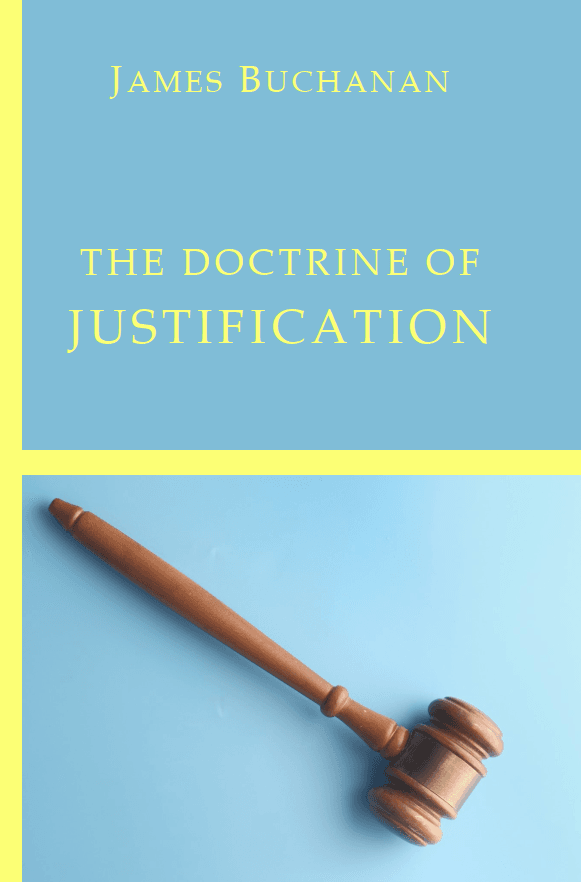In his 1867 masterpiece, The Doctrine of Justification, Scottish theologian James Buchanan surveys the history and doctrine of justification, recovering its central place in the gospel. This post provides a concise chapter-by-chapter summary, highlighting key teachings from Scripture.
Introduction: Why Justification Matters
“There is not a minister that dealeth seriously with the souls of men, but he finds an Arminian scheme of justification in every unrenewed heart.”
James Buchanan. Source: Wikipedia
“Therefore we conclude that a man is justified by faith without the deeds of the law.” (Romans 3:28)
- Buchanan asserts that justification by faith alone is essential to true Christianity.
- The Reformation was centered on the rediscovery of this truth: that justification is by faith alone.
- Modern tendencies toward rationalism and ritualism obscure the gospel.
- The need for clarity in doctrine arises from misinterpretation both within and outside Protestantism.
- Scripture, not tradition, is the final authority on justification.
Lecture I: History in the Old Testament
“Thus was the Gospel method of Justification ‘witnessed by the Law and the Prophets,’ for ‘the testimony of Jesus was the spirit of prophecy;’ and ‘to Him gave all the prophets witness, that, through His name, whosoever believeth in Him shall receive remission of sins.’”
“And he believed in the Lord; and he counted it to him for righteousness.” (Genesis 15:6)
- Justification appears in God’s covenant dealings with Abraham and David.
- The sacrificial system points forward to justification through atonement.
- Righteousness is accounted through faith, not personal merit.
- The Psalms and Prophets declare God’s mercy and forgiveness as justifying acts.
- Typology and messianic anticipation uphold forensic justification.
Lecture II: History in the Apostolic Age
“Paul especially, in his Epistles to the Romans and Galatians, sets himself to prove that both Jew and Gentile were ‘all under sin,’… and then proclaims another righteousness, even ‘the righteousness of God, which is by faith in Christ alone.’”
“Therefore being justified by faith, we have peace with God through our Lord Jesus Christ.” (Romans 5:1)
- The Apostles, especially Paul, taught justification as central to the gospel.
- It is distinct from law-keeping or moral reform.
- Paul addressed legalism in Romans and Galatians.
- James addresses a complementary point: the nature of living faith.
- The early church stood united on justification through Christ.
Lecture III: Among the Fathers and Scholastics

The earliest portrait of Saint Augustine in a 6th century fresco, Lateran, Rome. Source: Wikimedia
“They prove not merely the fact that the doctrine of a forensic Justification by grace through faith was held by these Fathers… and to faith alone, as the instrumental means, by which it is appropriated and made ours, when it is applied by the grace of the Holy Spirit.”
“Not by works of righteousness which we have done, but according to his mercy he saved us.” (Titus 3:5)
- Early post-apostolic Fathers were inconsistent on justification.
- They emphasized moral transformation and mixed justification with sanctification.
- Sacramentalism and legalism crept in.
- The forensic and imputed character of justification became obscured.
- Some faithful remnants upheld justification by grace.
Lecture IV: The Reformation Recovery
“The clearness with which they understood and explained this great truth… has ever been stated in more scriptural, unequivocal, and decided language, than in the writings of the early Reformers.”
“Knowing that a man is not justified by the works of the law, but by the faith of Jesus Christ.” (Galatians 2:16)
- Justification became the central issue of the Reformation.
- Luther championed “justification by faith alone” as the article by which the Church stands or falls.
- The Reformers recovered the biblical, forensic view.
- Rome’s teaching on infused righteousness was rejected.
- Confessions from multiple Protestant traditions agreed on the essentials.

Lecture V: Rome After the Reformation
“This is the radical error… Are we justified by our own righteousness, or by the righteousness of Christ?… by a righteousness imputed,
which is not in us, but in Him?”
“And if by grace, then is it no more of works: otherwise grace is no more grace.” (Romans 11:6)
- The Council of Trent codified Rome’s rejection of justification by faith alone.
- Justification was redefined as a process involving infused grace.
- Works were made instrumental in justification.
- Anathemas were pronounced on key gospel truths.
- Rome’s errors persist in modern Catholic teaching.
Lecture VI: Protestant Controversies
“These are the ultimate alternatives… affirming the equal necessity, and the inseparable connection, of the work of Christ for us, and the work of His Spirit in us, for our actual salvation.”
“Being justified freely by his grace through the redemption that is in Christ Jesus.” (Romans 3:24)
- Protestants were united in the doctrine but differed in language and emphasis.
- Errors arose like Antinomianism (against law) and Neonomianism (new law).
- Some blended justification and sanctification, confusing grace with merit.
- Luther, Calvin, and others insisted on the forensic nature of justification.
- Reformed confessions clarified the distinctions to guard against error.
Lecture VII: In the Church of England
“There is a glorifying righteousness… That whereby here we are justified is perfect, but not inherent. That whereby we are sanctified, inherent, but not perfect.”
“By his knowledge shall my righteous servant justify many; for he shall bear their iniquities.” (Isaiah 53:11)
- The 39 Articles affirmed justification by faith alone.
- Evangelical Anglicans remained committed to this doctrine.
- High Church views reintroduced sacramentalism.
- Buchanan praises English reformers for clarity.
- Official documents remained aligned with Protestant theology.
Lecture VIII: Meaning of the Term
“…wherever it is used with reference to our acceptance with God, it can only be understood in a judicial or forensic sense.”
“He that justifieth the wicked, and he that condemneth the just, even they both are abomination to the Lord.” (Proverbs 17:15)
- Justification is a forensic term meaning to declare righteous, not make righteous.
- Scripture uses it in opposition to condemnation.
- It is rooted in legal context, not moral or emotional transformation.
- The verdict is about standing before God, not internal sanctity.
- The term emphasizes a change of relation, not nature.
Lecture IX: Nature of the Blessing
“Although Sanctification be inseparably joined with Justification, yet they differ… sin is pardoned… the one doth equally free all believers from the avenging wrath of God…”
“Blessed is he whose transgression is forgiven… unto whom the Lord imputeth not iniquity.” (Psalm 32:1–2)
- Justification includes full pardon and acceptance with God.
- It is instantaneous and complete, not gradual.
- The believer receives a right to eternal life.
- It provides objective peace through a divine verdict.
- This blessing forms the basis for assurance and joy.
Lecture X: Relation to God’s Law and Justice
“God is ‘holy, and just, and good;’ and therefore His law also ‘is holy’… and it is derived from His essential and unchangeable nature.”
“To declare… that he might be just, and the justifier of him which believeth in Jesus.” (Romans 3:26)
- Justification does not bypass the law, but satisfies it.
- God remains just in justifying sinners through Christ.
- The law’s penalty was borne by the Substitute.
- Divine grace and justice meet at the cross.
- God’s moral government is upheld, not relaxed.
Lecture XI: Relation to Christ’s Work
“That Law required the punishment of sin… and by thus connecting His penal sufferings with the evil desert of sin, and His vicarious obedience… we are enabled to apprehend more clearly our need of both.”
“By his knowledge shall my righteous servant justify many; for he shall bear their iniquities.” (Isaiah 53:11)
- Christ’s obedience and sacrifice are the full basis for justification.
- He fulfilled the law and bore its curse.
- He acted as our Surety and Representative.
- All righteousness is found in Him alone.
- His work is once-for-all, perfect, and sufficient.
Lecture XII: Ground of Justification
“The two righteousnesses are not only distinct, but different… mutually exclusive, considered as grounds of Justification.”
“Not having mine own righteousness… but that which is through the faith of Christ.” (Philippians 3:9)
- The sole ground is Christ’s imputed righteousness.
- Faith is the instrument, not the cause.
- Justification is not based on anything in us.
- The legal transfer of Christ’s merit is essential.
- All boasting is excluded.
Lecture XIII: Grace vs. Works
“Wherever sin exists, there can be no Justification by works… for ‘all have sinned and come short of the glory of God.’”
“If by grace, then is it no more of works: otherwise grace is no more grace.” (Romans 11:6)
- Grace excludes all forms of merit or cooperation.
- Works cannot contribute to or secure justification.
- Salvation is entirely unearned.
- James addresses the evidence of faith, not its basis.
- Justification by grace glorifies God.
Lecture XIV: Connection to Faith
“It is simply an instrumental means,— like the hand which a beggar stretches out to receive alms,—by which we apprehend Christ…”
“As many as received him, to them gave he power to become the sons of God.” (John 1:12)
- Faith unites the believer to Christ.
- It is not meritorious but receptive.
- Faith is God’s appointed means for justification.
- The power lies in its object, not itself.
- Faith and justification are inseparably linked.
Lecture XV: Role of the Holy Spirit
“There is, perhaps, no more subtle or plausible error… than that which makes [justification] to rest on the… work of the Holy Spirit in the heart.”
“He shall glorify me: for he shall receive of mine, and shall show it unto you.” (John 16:14)
- The Spirit regenerates and enables saving faith.
- He reveals Christ to the heart.
- He applies the blessings of justification.
- Assurance and sanctification are His continuing work.
- Justification begins with the Spirit’s initiative.
Conclusion
“We conclude, in the brief, but clear and comprehensive, words of the Westminster Divines: ‘JUSTIFICATION IS AN ACT OF GOD’S FREE GRACE,—WHEREIN HE PARDONETH ALL OUR SINS,—AND ACCEPTETH US AS RIGHTEOUS IN HIS SIGHT,—ONLY FOR THE RIGHTEOUSNESS OF CHRIST,—IMPUTED TO US,—AND RECEIVED BY FAITH ALONE.’”
“But we preach Christ crucified, unto the Jews a stumblingblock, and unto the Greeks foolishness.” (1 Corinthians 1:23)
- Justification by faith is the core of the gospel.
- Its clarity ensures peace, assurance, and joy.
- Its distortion leads to bondage and false religion.
- Pastors and laypeople alike must uphold this truth.
- Buchanan ends with a plea: preach Christ, and Him crucified.




 “There is a glorifying righteousness… That whereby here we are justified is perfect, but not inherent. That whereby we are sanctified, inherent, but not perfect.”
“There is a glorifying righteousness… That whereby here we are justified is perfect, but not inherent. That whereby we are sanctified, inherent, but not perfect.”





